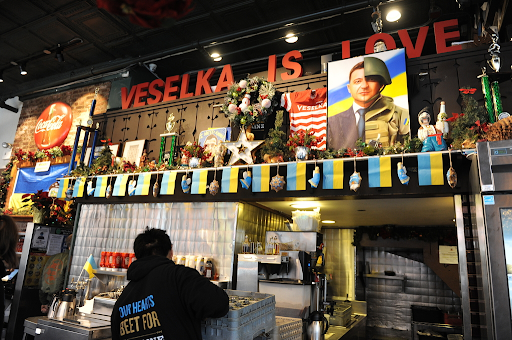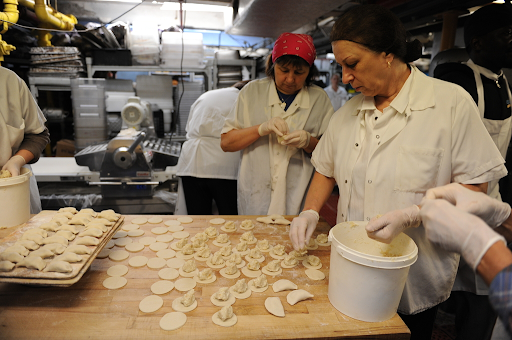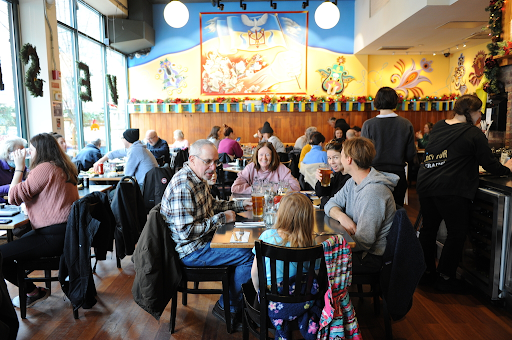Taste a Little Bit of Ukraine: Inside Veselka, A Historic East Village Restaurant
A staple of New York City history, Veselka is a place of comfort and advocacy — all while serving authentic Ukrainian cuisine.
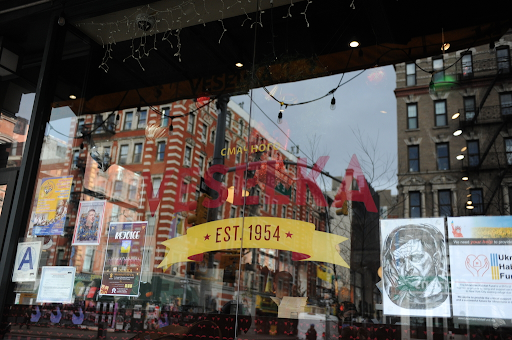
Veselka is situated in the East Village neighborhood with a high Ukrainian population. From the St. George Church to Ukrainian cultural festivals, Veselka is described as “a little piece of Ukrainian heaven.”
“Make borscht, not war,” reads a wooden chalkboard sign at the corner of 2nd Avenue and East 9th Street.
Upon a closer look, the sign is carefully handwritten in vibrant shades of blue and yellow, with a pink radish drawing in the center. The building next to it is decorated with various street art and window lights, and in the middle of the red-and-yellow awning stands one word: Veselka.
Established in 1954, Veselka is a Ukrainian restaurant located in the heart of the East Village. The name translates to rainbow in Ukrainian, and for the past seven decades, Veselka has served signature homestyle Ukrainian dishes — from borscht and pierogi to latkes and blintzes.
I met with Jason Birchard, the current third-generation owner of Veselka. His grandfather, Wolodymyr Darmochwal, founded the restaurant after immigrating to New York from Ukraine in the late 1940s. When his father inherited the family business, Birchard began working as a teenager, taking on all kinds of tasks.
JASON BIRCHARD: When I worked here in high school, I practically did everything, from a busboy to a cashier. The only thing I didn’t do was make pierogi, which are Ukrainian dumplings with all kinds of filling – that job is reserved for several older ladies who often make thousands of them at a time.
CHARLOTTE ZHOU: Did you always know you wanted to work here?
JB: Not at all. After high school, I went to college to study economics, but soon realized that field wasn’t for me. What I really wanted was to work with people, so I came back to Veselka after graduation. I worked for seven to eight years, until moving to Hawaii and Japan for a bit, but came back in 2000. I’ve been here ever since.
CZ: Veselka is a lot bigger and more well-known now, with different locations, nationwide shipping, and a larger interior space. What was it like watching the restaurant grow and being a part of it?
JB: To me, Veselka is still a family business despite expanding. We had to adjust to its growing popularity by trying out different things, like opening other locations. Veselka, and Ukrainian food as a whole, lend well to the quick-serve concept, so we’ve been trying to open more small pop-ups. So there’s Veselka Essex on Delancey Street, and it’s also been our fourth or fifth year at the Union Square and Bryant Park Holiday Markets. Currently, we’ve been negotiating to open spots in Grand Central and Rockefeller Center as well.
Bronx Science shares the same fervor for Veselka. “My visit to the primary location was incredibly memorable. I loved the warm atmosphere, and I can’t wait to try out its new, smaller locations for more grab-and-go food,” said Sarah Cheng ’24.
Mr. Walter Giorgis-Blessent, French teacher at Bronx Science, echoes this as well. “I like Veselka’s vibe, its layout, its customers, its big mural, and, especially, its sautéed pierogi and borscht!” he said. “The last time I was there was three years ago with my niece and friends from Europe, but nothing has changed since I discovered the restaurant back in 2001.”
JB: Another big transition was being open 24/7. Now, we’re back to regular hours after COVID-19 hit. But the original decision was due to there being a lot of student community and younger generations in the area, like NYU dorms and bars. The overall rising nightlife called on us to keep Veselka open later at night, so we started opening 24 hours on weekends at first. In 1991, we opened 24/7.
CZ: How was Veselka during COVID-19? I imagine not being open 24/7 anymore changes the original culture.
JB: Definitely. We closed for 8 weeks during the onset of COVID-19, and undoubtedly, it was very difficult and stressful. If it helps you visualize, there’s a photo somewhere online of me sitting here alone with my face in my hands. I couldn’t really get quality help, and I honestly didn’t think Veselka could survive.
Before the pandemic, Veselka made 21,000 pierogis, 2,500 latkes, and 110 gallons of borscht each week. Although the COVID-19 pandemic decreased this number, Veselka’s popularity remains strong: in the eyes of the East Village community, Veselka is always a staple of Little Ukraine.
JB: Thankfully, everyone was very supportive. Our nationwide shipping (partnered with Goldbelly) was critical in staying afloat. But the most important thing is the community and our customers — it’s rewarding to know that people didn’t forget about Veselka.
Slava Ukraini: Veselka’s Role in the Ukraine War
A year ago, Russian President Vladimir Putin’s invasion of Ukraine in February 2022 sent shockwaves around the world, and Veselka was no exception. As a beacon of Little Ukraine, Veselka is decorated with Ukraine’s national colors of blue and yellow inside and out, as well as portraits of Ukrainian President Volodymyr Zelenskyy. One of the most striking interior features, right at the entrance, is the large red block letters near the ceiling, reading ‘VESELKA IS LOVE.’ Small Ukraine flags line the entrance to the basement kitchen.
When I approached the topic, Birchard shook his head and sighed, “Where do I even begin?”
JB: February 2022 was tough for all of us. When Russian troops first started building up on the Ukrainian border, we got a lot of press here because many people believe Veselka to be the center of Little Ukraine. Before the war started, I was optimistic it wouldn’t escalate. But the day they invaded, I was shocked.
In 2020, Veselka bought out Dinosaur Hill, the toy store next door, in order to expand and renovate. The renovation is currently paused, however, due to the ongoing conflict in Ukraine.
JB: The whole thing was incredibly devastating and upsetting. That’s why we held off on renovating, because we wanted to be a place where people could come for solace or just to talk to other people. Many staff and customers were very upset, to say the least, but we banded together and we knew we could persevere. The one thing we all knew was that we could help Ukraine with food and other necessities.
JB: Of course, we serve a lot of borscht here at Veselka, so we decided that all borscht sales would go to humanitarian efforts. Soon, we raised over $250,000 to donate to multiple relief efforts, like World Central Kitchen, Razom, and United 24, President Zelenskyy’s own organization.
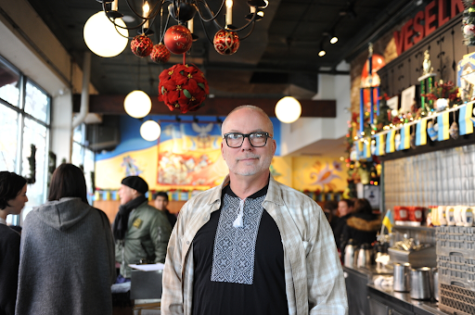
Veselka also partnered with the local St. George Ukrainian Catholic Church to help Ukraine outside of food, which was an employee-inspired effort. Mr. Birchard and other Veselka staff organized the collection of items that were highly in need, such as coats, child and infant care products, first aid kits, and more. During that time, staff, and residents of the community often dropped by with donations. After collecting these items, the St. George Church took on the next step of packaging and shipping everything to Ukraine.
JB: The one thing I want everyone to remember is that even though the war isn’t really on the mass media headlines like it used to be, it is still ongoing and actively affecting people in Ukraine and Russia. It’s much bigger than a fight for power or a military offensive — it’s a war against free democracy. We are still heartbroken and trying our best, but I’m very grateful for all the love that Veselka has gotten and especially for the support during this time. It’s a reminder of what allows me to do what I do.
The Customers
I was lucky enough to visit Veselka on Ukrainian Christmas, January 7th, 2023. Even on a day when the wind was penetratingly cold and temperatures were nearly subzero, the line wrapped around the block just the same, with festivity and warmth echoing throughout every corner of the restaurant.
Inside, I first spoke to a young couple, who was eating the traditional Ukrainian food that Veselka was best known for. Their sweaters were coordinated with the colors of the Ukrainian flag, and their table was covered with borscht and pierogi.
ROMAN: I’d call myself a pretty regular diner here — I’ve probably been here up to ten times. The authentic food reminds me of home and my family, and since today is Christmas, of course we had to come here.
As I visited tables inside, the line outside grew rapidly. One family in line decided to make the most of a weekend together.
RIGA: My dad is in New York for a short layover, so we decided here was the best place to meet for brunch. Aside from the pierogi, my favorite part about Veselka is the ethnic Ukrainian background. I also love the classic diner feeling.
When I told them about Veselka donating borscht sales, Riga’s father immediately said, “Looks like we’re getting some borscht today, too.”
Veselka is equally appealing to people from different cultures and traditions. Afterward, I returned back inside and had a conversation with two older gentlemen who stopped by for a quick bite before returning to work at the nearby Channel 4 station. Ahmos Benger, who insisted on being called Art, has been a regular customer for almost as long as the restaurant has opened its doors.
ART: I first started coming here when Veselka was a small family restaurant that sold newspapers and candy, and I’d always pick up a magazine called the American Cinematographer. And eventually, when the place grew, I watched it grow.
He ordered Ukrainian crepes, while his colleague went with crispy pierogi. I asked him his favorite dish, slightly expecting him to answer with the crepes he was eating or pierogi like everyone else. Instead, he responded with a simple “Impossible. I have too many.” He then proceeded to list a variety of dishes, such as oatmeal with raspberry sauce (which he lamented was unavailable on weekends) and cucumber cold soup during the summertime (which was “spicy just right”).
A few tables away, another diner named Steve was enjoying a plate of waffles. He already considers himself a regular, but added that after his recent retirement, he will be visiting a lot more frequently.
When I asked him his favorite part of Veselka, Steve immediately answered: “The people.” But he followed up quickly with “And the food, of course!”
“Many staff and customers were very upset, to say the least, but we banded together and we knew we could persevere. The one thing we all knew was that we could help Ukraine with food and other necessities,” said Jason Birchard.
Charlotte Zhou is an Editor-in-Chief for ‘The Science Survey.’ In addition to writing and editing articles, she constructs the online crossword and...

